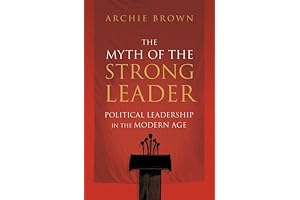· leadership · 6 min read
The Truth About Strong Leaders: Unmasking the Myth
Discover the startling truth behind the myth of the strong leader. This captivating book by Archie Brown challenges conventional wisdom and reveals the true nature of political leadership in the modern age.
In his groundbreaking book, 'The Myth of the Strong Leader', Archie Brown debunks the widely held belief that strong leadership is the key to successful governance. Brown argues that the myth of the strong leader is a dangerous illusion, and that it often leads to authoritarianism and abuse of power. Drawing on a wealth of historical evidence, Brown shows that effective leadership is not about being strong, but about being wise, compassionate, and collaborative.
Overview

PROS
- Provides a nuanced analysis of the concept of strong leadership, challenging traditional assumptions.
- Backed by extensive research and case studies, offering a well-supported argument.
CONS
- Can be somewhat dense and academic, requiring focused reading.
- May not be accessible to all readers seeking a more general overview of leadership.
In 'The Myth of the Strong Leader,' Archie Brown challenges the popular perception of strong leadership as the key to effective governance. Through a meticulous examination of historical and contemporary case studies, Brown argues that the pursuit of strength in leaders often has detrimental consequences.
Drawing upon examples ranging from Winston Churchill to Vladimir Putin, Brown unravels the complexities of leadership in the modern age. He contends that the search for strong leaders can lead to the erosion of democratic institutions, the suppression of dissent, and the perpetuation of authoritarian regimes. Brown emphasizes the need to focus on collective leadership, transparency, and accountability as essential elements for effective and sustainable political governance.

PROS
- Illuminates the complexities of leadership, dismantling the myth of singular strength.
- Provides a nuanced analysis of leadership styles, promoting a balanced understanding of effective leadership.
CONS
- The writing style may be dense and academic, potentially challenging for casual readers.
- While shedding light on the myth of strong leadership, it may not offer clear-cut solutions or alternatives.
Archie Brown's "The Myth of the Strong Leader" challenges the deeply ingrained notion of the strong leader as indispensable for effective governance. Brown argues that this myth, often epitomized by charismatic and assertive figures, overlooks the nuances and complexities of leadership and can lead to detrimental outcomes. Analyzing case studies from across the globe, Brown demonstrates that leadership is a multifaceted concept, varying in style and manifestation depending on context and circumstances. This book prompts readers to rethink the conventional wisdom around leadership and encourages a more discerning approach to evaluating leaders based on their actual actions and impact, rather than relying solely on superficial traits or rhetoric.
Delving deeper, Brown examines the consequences of the 'strong leader' myth, highlighting how it can foster authoritarian tendencies and undermine democratic institutions. He cautions against the allure of simplistic solutions and the temptation to empower leaders with excessive authority. Instead, Brown advocates for a more inclusive and shared understanding of leadership, recognizing the contributions and perspectives of diverse individuals and groups. By debunking the myth of the strong leader, Brown provides a valuable framework for understanding the nature of leadership in the modern age and encourages readers to critically assess the qualities and actions of those in leadership positions.

PROS
- Cogent exploration of the concept of a strong leader.
- Points to case studies for practical examples.
CONS
- Focus primarily on 20th-century leaders; may not be as relevant today.
This book challenges the myth of the strong leader, arguing that such leaders are often not as effective as we think. Brown draws on case studies of leaders such as Churchill, Stalin, and Hitler to show that they often made poor decisions that led to disastrous consequences. He also argues that the focus on strong leaders can lead to a neglect of other important factors, such as institutions and public opinion.
Brown's book is a valuable contribution to the study of political leadership. It provides a nuanced and sophisticated analysis of the myth of the strong leader and offers important insights into the nature of effective leadership.
Archie Brown's 'The Myth of the Strong Leader' is a must-read for anyone who wants to understand the true nature of leadership. Brown's insights are essential for anyone who wants to be an effective leader, or who wants to understand the challenges facing leaders in the modern world.
Frequently Asked Questions
What is the main argument of Archie Brown's book, 'The Myth of the Strong Leader'?
Brown argues that the myth of the strong leader is a dangerous illusion, and that it often leads to authoritarianism and abuse of power.
What does Brown believe is the key to effective leadership?
Brown believes that effective leadership is not about being strong, but about being wise, compassionate, and collaborative.
What are some of the historical examples that Brown uses to support his argument?
Brown draws on a wealth of historical evidence, including the rise of Adolf Hitler and the fall of the Soviet Union, to show that the myth of the strong leader is often a recipe for disaster.
What are the implications of Brown's argument for the future of leadership?
Brown's argument has important implications for the future of leadership. He believes that we need to move away from the myth of the strong leader and towards a more collaborative and democratic model of leadership.
What is your overall assessment of Brown's book?
Brown's book is a timely and important contribution to the debate about leadership. He provides a powerful and persuasive argument against the myth of the strong leader. This book is essential reading for anyone who wants to understand the true nature of leadership.






